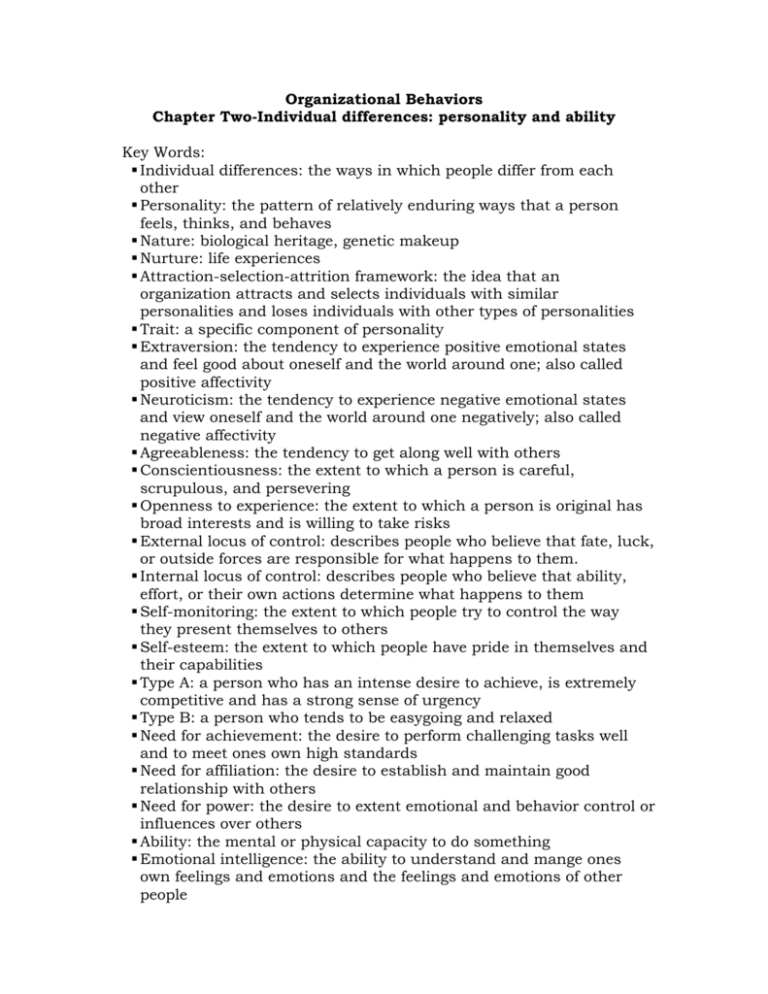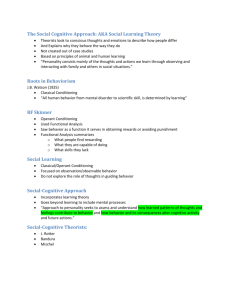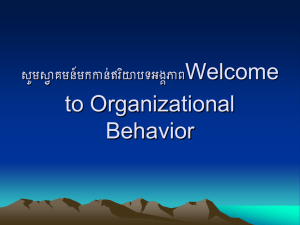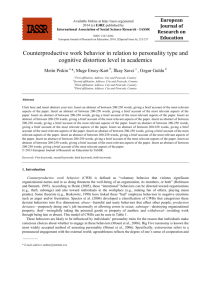Organizational Behaviors
advertisement

Organizational Behaviors Chapter Two-Individual differences: personality and ability Key Words: Individual differences: the ways in which people differ from each other Personality: the pattern of relatively enduring ways that a person feels, thinks, and behaves Nature: biological heritage, genetic makeup Nurture: life experiences Attraction-selection-attrition framework: the idea that an organization attracts and selects individuals with similar personalities and loses individuals with other types of personalities Trait: a specific component of personality Extraversion: the tendency to experience positive emotional states and feel good about oneself and the world around one; also called positive affectivity Neuroticism: the tendency to experience negative emotional states and view oneself and the world around one negatively; also called negative affectivity Agreeableness: the tendency to get along well with others Conscientiousness: the extent to which a person is careful, scrupulous, and persevering Openness to experience: the extent to which a person is original has broad interests and is willing to take risks External locus of control: describes people who believe that fate, luck, or outside forces are responsible for what happens to them. Internal locus of control: describes people who believe that ability, effort, or their own actions determine what happens to them Self-monitoring: the extent to which people try to control the way they present themselves to others Self-esteem: the extent to which people have pride in themselves and their capabilities Type A: a person who has an intense desire to achieve, is extremely competitive and has a strong sense of urgency Type B: a person who tends to be easygoing and relaxed Need for achievement: the desire to perform challenging tasks well and to meet ones own high standards Need for affiliation: the desire to establish and maintain good relationship with others Need for power: the desire to extent emotional and behavior control or influences over others Ability: the mental or physical capacity to do something Emotional intelligence: the ability to understand and mange ones own feelings and emotions and the feelings and emotions of other people Key concepts: Managers need to understand individual difference because they have an impact on the feelings, thoughts, and behaviors of each member of an organization Individual differences include personality differences and differences in ability Personality develops over time responding to the experiences people have as children and as adults Personality is useful for explain and predicting how employees feel, think, and behave on the job o In organizations in which situations pressures on employees behaviors are strong, personality may not be a good predictors of on-the job behavior Effective managers recognize that the various situations and personality types interact to determine feelings, thoughts, attitudes, and behaviors at work Overtime, ASA processes may result in these organizations being composing or large numbers of the same type of people. The nature of the organization influences employees feelings only making their personalities, behaviors and beliefs stronger The hierarchical organization of personality o Extraversion: positive emotions, gregariousness, warmth o Neuroticism: anxiety, self-consciousness, vulnerability o Agreeableness: trust, straightforwardness, tendermindedness o Conscientiousness: competence, order, self-discipline o Openness to experience: fantasy, actions, ideas Research suggests that the big five traits are important for understanding work-related attitudes and behaviors and thus our understand of organizational behavior People differ in how much control they believe they have over situations they are in and over what happens to them Organizationally relevant personality traits o Locus of control o Self-monitoring o Self-esteem o Type A and Type B personality o Need for achievement o Need for affiliations o Need for power When looking at individual differences and the way they affect the attitudes and behaviors of employees, we much look not only at each employee’s personality but also at the abilities, aptitudes, and skills the employee possesses. General intelligence o Verbal ability o Numerical ability o Reasoning ability o Deductive ability o Ability to see relationships o Ability to remember o Spatial ability o Perceptual ability Nature: biological heritage cognitive and physical abilities nurture: education, practice, and exercise The management of ability in organizations o Selection: mangers can control ability by selecting individuals who have the abilities they need o Placement: once individuals are selected and become part of an organization, managers must accurately match each employee to a job that will capitalize on his or her abilities o Training: training related to the nurture aspects of ability and can be effective means of enhancing employees abilities










